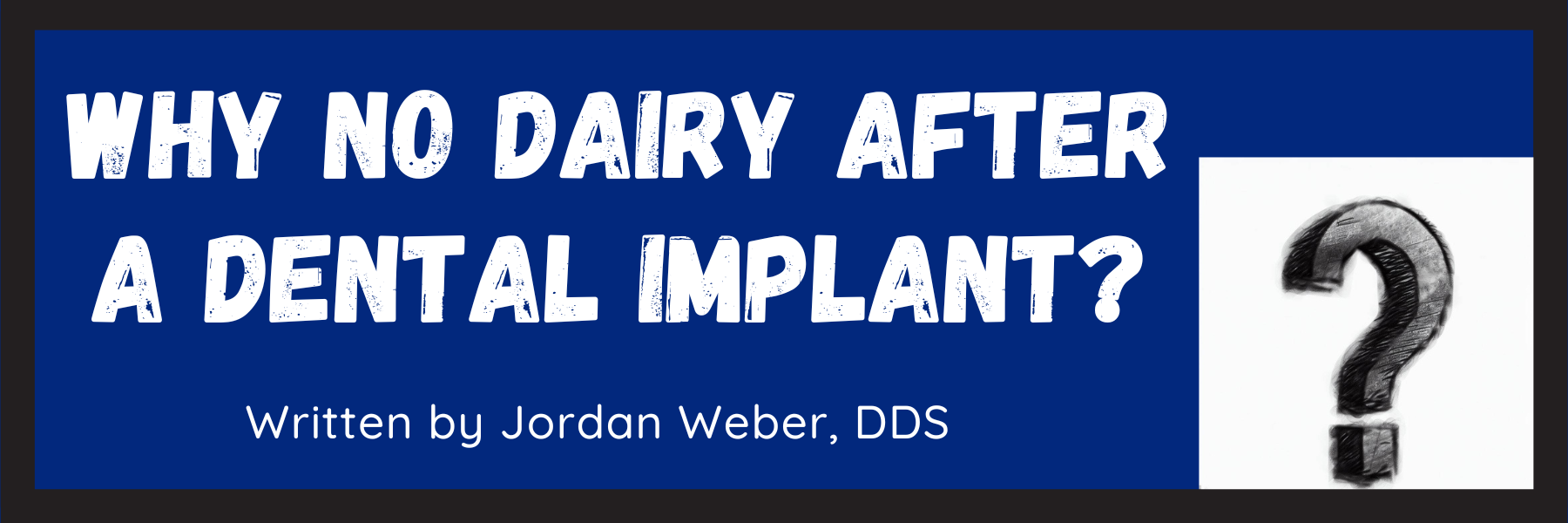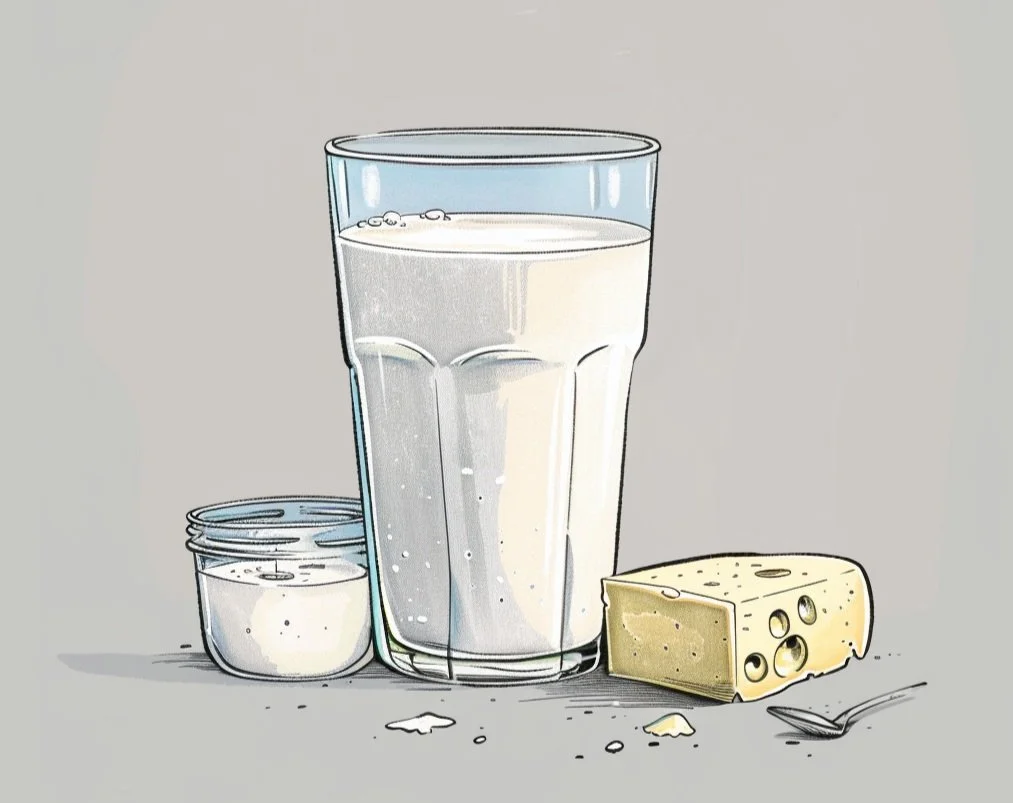Following a dental implant surgery, patients are often inundated with a list of dos and don'ts aimed at ensuring a smooth and successful recovery. Among these recommendations, the advice to avoid dairy products stands out as a common — but somewhat puzzling — directive.
This guidance, however, lacks substantial scientific evidence to back it up, leaving many to wonder about its validity.
In this article, we’ll look into the topic of dairy consumption post-dental implant procedure, seeking to clarify misconceptions and shed light on what the evidence — or lack thereof — actually suggests. Our goal is to provide a clearer understanding of post-operative dietary guidelines and dispel any unfounded fears associated with dairy products during the recovery phase.
Quick Answer: Why Can I Not Eat Dairy After a Dental Implant?
Consuming dairy products after dental implant surgery is generally safe and poses minimal risk of complications. There's no solid scientific evidence linking dairy consumption to adverse effects on the implant site.
It may be wise to avoid unpasteurized dairy products, as they may contain harmful bacteria. Opt for pasteurized dairy to minimize health risks during recovery.
Benefits of Dairy: Dairy products offer essential nutrients like calcium, vitamin D, and protein, which are beneficial for healing. In fact, vitamin D deficiency is strongly linked to dental implant failure. Soft dairy options such as yogurt, cottage cheese, and milk smoothies are recommended, particularly during the first few days/weeks of healing.
Dairy can be safely included in the post-operative diet as part of a balanced intake. Choose soft, easy-to-consume dairy products to support recovery without stressing the surgical site.
By understanding the myths and facts about dairy consumption after dental implant surgery, patients can make informed dietary choices that aid in their recovery process, ensuring a swift and successful healing period.
The Origin of the Dairy Myth
The advice to avoid dairy after dental implant surgery seems to stem from a broader set of dietary precautions typically recommended after oral procedures. Historically, post-surgical advice has often erred on the side of caution, advocating for the elimination of certain food types to prevent complications such as infection or discomfort.
Dairy products, being rich in lactic acid bacteria, might have been mistakenly associated with an increased risk of infection, or contributing to inflammation, thereby complicating the healing process.
However, this specific recommendation appears to lack a solid foundation in scientific research and may have been generalized from anecdotal experiences or overly cautious principles rather than evidence-based findings.
It's important to scrutinize such advice and understand its origins to make informed decisions about our post-operative care.
Dairy Consumption Post-Tooth Extraction & Implant Surgery
Contrary to the cautionary stance on dairy, consuming dairy products after dental procedures, including tooth extractions and implant surgeries, is generally considered safe and poses minimal risk to the patient.
Dairy's bad reputation in the context of dental recovery seems unfounded when examining the nutritional benefits it offers. Dairy products are rich sources of calcium and protein — key nutrients essential for bone health and the healing process.
Calcium plays a crucial role in bone regeneration and repair, which is vital for the successful integration of a dental implant into the jawbone.
Protein supports tissue repair and immune function, further contributing to a smooth recovery.
Vitamin D deficiency is linked with dental implant failure — depriving yourself of calcium or vitamin D during the recovery process simply doesn’t make sense.
The absence of scientific evidence linking dairy consumption to localized bacterial overgrowth at the implant site further supports the safety of including dairy in one's post-operative diet. In fact, the nutritional advantages of dairy can be particularly beneficial during recovery, provided that the products consumed are pasteurized and chosen with care to ensure they are soft and easy to consume, minimizing any mechanical stress on the surgical site.
Thus, rather than shunning dairy altogether, patients should feel encouraged to include it as part of a balanced, recovery-supportive diet.
Addressing the Concerns About Dairy
The apprehension surrounding the consumption of dairy products after dental procedures may lead some patients to unnecessarily restrict their diets, potentially missing out on important nutrients that could aid in their recovery. It's essential to address these concerns and separate myth from fact.
First, the risks associated with consuming dairy after dental interventions are generally low.
The idea that dairy products could significantly contribute to complications by fostering bacterial growth around the implant site is not supported by scientific evidence.
Dairy products, especially those that are pasteurized and consumed as part of a balanced diet, do not create an environment that uniquely promotes bacterial overgrowth any more than other food types.
Moreover, the belief that dairy can increase mucous production and thereby affect the healing process is also not backed by scientific research.
While individual responses to dairy may vary, for the majority of people, dairy consumption does not exacerbate mucous production to a degree that would impact dental healing negatively.
In light of this, patients can be reassured that including dairy in their post-operative diet should not pose a significant risk to their recovery or implant success.
The Case Against Unpasteurized Dairy Products
While the general consensus is that dairy products are safe to consume after dental procedures, a notable exception exists with unpasteurized dairy products.
Unlike their pasteurized counterparts, unpasteurized dairy items can harbor harmful bacteria such as Listeria, Salmonella, and E. coli, which pose a real risk of infection, especially in the vulnerable post-operative period. The process of pasteurization involves heating the dairy product to a specific temperature for a set duration to kill off these potentially dangerous microorganisms, making the product safe for consumption.
Given the compromised nature of the body's defenses in the aftermath of dental implant surgery and the importance of preventing any infection that could impede healing, it is advisable to avoid unpasteurized dairy products during the recovery period.
Patients should be encouraged to read labels carefully and opt for pasteurized dairy options to enjoy the nutritional benefits of dairy without exposing themselves to unnecessary risks.
By making informed choices about the types of dairy products they consume, patients can support their recovery while minimizing potential health hazards.
Recommended Dietary Practices Post-Implant Surgery
Navigating the dietary do's and don'ts after dental implant surgery is crucial for a smooth recovery. The focus should be on consuming soft, easy-to-chew foods that provide essential nutrients without placing undue stress on the implant site.
In this context, dairy products can play a beneficial role in the post-operative diet, provided they are selected with care.
Soft dairy options such as yogurt, cottage cheese, and ricotta can be excellent sources of protein and calcium, contributing to the healing process.
Smoothies made with milk or kefir can also serve as nutritious, soothing meals, offering both hydration and essential vitamins and minerals.
For those looking for a comforting warm beverage, warm (not hot) milk can be soothing.
Cheese, provided it is soft and easily consumable without requiring extensive chewing, can also be included in small amounts.
It's important to remember that while dairy can be part of a healthy post-surgery diet, variety is key. Incorporating a range of other soft foods like soups, broths, pureed vegetables, and soft fruits will ensure a balanced intake of nutrients.
Always start with soft textures, gradually introducing more varied textures as your healing progresses.
Final Thoughts
Throughout this article, we've explored the myth that dairy should be avoided after dental implant surgery and found that, when chosen carefully, dairy products can indeed be a safe and nutritious part of the recovery diet.
The concerns often associated with dairy consumption post-surgery — such as increased risk of bacterial overgrowth and complications — are largely overstated and not supported by scientific evidence. However, it is wise to steer clear of unpasteurized dairy products due to the risk of harmful bacteria they may contain.
Incorporating soft, pasteurized dairy products into your post-operative diet can offer valuable nutrients to aid in your recovery. As with any dietary advice following medical procedures, it's essential to consult with your dental professional for personalized guidance tailored to your specific needs and health status.
By debunking myths and making informed choices, patients can enjoy a diverse and nutritious diet that supports healing and contributes to the success of their dental implant surgery. Remember, achieving a successful recovery involves not only following professional medical advice but also nourishing your body with the right foods. Dairy, when selected thoughtfully, can be part of this holistic approach to your post-surgery care.
FAQs
What Foods to Avoid After Dental Implant?
After a dental implant, it's crucial to avoid foods that could jeopardize the healing process. This includes hard foods (like nuts and seeds), sticky foods (such as candies and dried fruits), chewy foods (like steak or gum), and extremely hot or cold foods that could cause discomfort. Also, avoid foods with small, hard pieces that could get lodged in the surgical area.
Can I Eat Ice Cream After Dental Implant?
Yes, ice cream can be consumed after dental implant surgery. Its soft texture and cool temperature can help soothe the implant site. Choose simple flavors without nuts, chocolate chips, or other hard pieces.
Can I Eat Yogurt After Dental Implant?
Absolutely, yogurt is an excellent choice after dental implant surgery. Its smooth, creamy texture makes it easy to eat, and it's packed with nutrients beneficial for healing.
When Can I Drink Coffee After Dental Implant Surgery?
It’s advisable to wait at least 48 hours before drinking coffee. Coffee is hot and can irritate the surgical site, plus the caffeine may increase swelling and bleeding.
Can I Eat Scrambled Eggs After Dental Implant Surgery?
Scrambled eggs are a safe and nutritious option after dental implant surgery. They are soft, easy to chew, and high in protein, supporting the healing process.
When Can I Eat Pizza After a Dental Implant?
It's best to wait until you've significantly healed before eating pizza, typically a few weeks post-surgery. The crust can be tough to chew, and the toppings might be too hot, posing a risk to the healing implant site.
* Though the author of this post is a licensed dentist in the state of Kansas, this information is provided for informational and educational purposes only. Please use your best judgment and contact emergency medical services in the event of an emergency.




